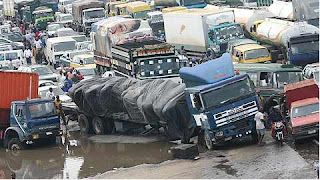Fuel Crisis and Implications on Lagos Traffic By Chigozie Chikere
The school of Lagos-watchers that keep an eye on the city’s
traffic management chiefly out of a morbid fear of decline or of possible worst-case
scenario has taken on new adherents of late. For signs are mounting that the stakeholders’response
to the revolutionary measures taken by Governor Akinwunmi Ambode less than a
week after his inauguration to tackle the Apapa gridlock has slowed – or even,
some say, gone into reverse. Though the governor and his team have continued in
a most civil manner to confront the menacing situation by experimenting on a
range of time-honoured strategies including consultations with stakeholders and
inspection tours to black spots, the chief worry is that the situation goes beyond
what a state can handle. It is connected to fuel scarcity,which obviously
reflects the failure of a nation to harness and effectively manage her natural
resources.
What started as crawling traffic in and out of the Tin-Can
Island ports, the tank farms, the factories, and other establishments and
investments that generate traffic around the ports has degenerated into a
landmark of endless and apparently stagnant queues of trailers and tankers. The
road pavements between the Coconut and Liverpool bridges have continued to fail
and to give way to deep gullies, rapidly turning the road into an impasse. Freight
Forwarders and Importers lament on the galloping losses they incur daily as a
result of delays and mishaps.
This exacerbates a deeper unease: a belief that the visit of
the Senate Committee on Marine Transport last week to Tin-can Island is of no
consequence since the delegates were unable to access the flashpoints for
firsthand assessment. The belief is reinforced by reports of refusal of the delegation to
show concern and commitment by walking down the road, inspecting and assessing
the damage, mingling with stakeholders and the people, asking relevant questions,
hearing them out, feeling their pains, encouraging them, and giving them a
sense of belonging.As it stands, the delegation is being written off on the
grounds that it lacked remedial instincts.
For some years now since our refineries packed up and the
nation’s demand for fossil fuel continued to depend on imports, increased
tanker traffic to the over 45 tank farms in Apapa has left endemic traffic
gridlocks in its wake and, to this effect, experts have continued to hold the
tank farms culpable and have at different fora advocated their relocation. Contrary to this view, Ambode’s government, people-oriented
as it has turned out to be, has given a 90 days grace period to operators of
tank farms to expand their loading bays so as to enhance their service delivery
and reduce the tanker queue or otherwise risk being shut down.
However, is this growing concern about tank farms justified?
Mostly not. Take the downstream oil industry serviced with subsidy payments and
plagued with comatose refineries. The poor performance of our refineries is
responsible for the oil marketers’ dependence on importation and consequently
the quayside tank farms. Certainly, the anaemic performance of the sector is responsible
for the prevailing traffic situation in Apapa and this follows long years of
extraordinary distress.The Federal Government has over the weekend repaid N413bn
subsidy to oil marketers and tankers have started loading from the tank farms.
Habits are hard to change. So even though the once growing queue of tankers is
steadily dwindling because oil marketers have been paid and tank farms have
become operative, this has not reflected on the refining capacity of our
refineries.And so, in all fairness, if the Federal Government does not expedite
the ongoing turnaround maintenance for our refineries, the queues are sure to
return. Notwithstanding, Lagos State Government’s directive for tank farms and
their loading bays is in order and implementation will be effective provided oil
marketers are paid their subsidies as at when due or our refineries begin to
operate at full capacity.
Meanwhile, expectations are rising, even if habits have not
yet caught up. The Minister of State for Petroleum Resources has assured that
two out of Nigeria’s four Refineries would be re-streamed for production before
December 31, 2015. And to ensure that a permanent solution was found to the
perennial fuel scarcity the country has been facing, the minister reiterated
that efforts were on to engage private investors to build new refineries within
the premises of existing ones to enable benefit from economy of scale by
sharing some operational facilities, such as power, pipelines and other
resources.
This revelation is one lifeline for the daunting traffic
gridlock in Apapa. As the minister continues to throw out hints of wanting to
bring about far-ranging structural change in the oil and gas industry, we wish
him well. For Governor Ambode, these are early days though he seems to have set his priorities right. With the determination and the zeal
with which he is addressing traffic issues in Lagos, especially in Apapa, reformist
achievements are no doubt in the offing.
Chigozie Chikere,
Chartered Member, the Chartered Institute of Logistics & Transport
(CILT) Nigeria
E-mail: grandefather@yahoo.com
Phone: 08039504536




Comments
Post a Comment